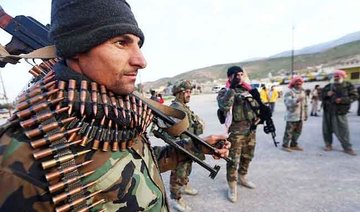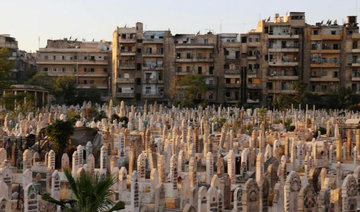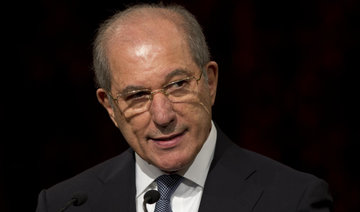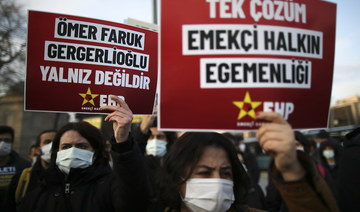BEIRUT: Syria’s long-running civil war may be winding down slowly, but the country is awash in weapons and a confounding array of local militias and thousands of foreign troops, some of which may never leave.
With crucial aid from allies Iran and Russia, President Bashar Assad has regained control over large areas of Syria in advances that appear to have put to rest the possibility of a military overthrow, at least for now. But his rule is extremely reliant on continued assistance from Iranian-sponsored militias, which have spread across the war-ravaged country.
The fight against the Daesh group, which proliferated soon after the conflict began in 2011, has provided a convenient justification for foreign troops to be deployed in Syria with the pretext of fighting the extremists. Now that Daesh no longer holds any significant urban territory in Syria, the numbers of some forces may be scaled down, but foreign powers with longer-term ambitions and interests will try to maintain a presence in the country for years to come. That will further complicate prospects for a peace settlement.
Some countries have already indicated that they plan to stay for the foreseeable future.
The Americans
The presence of US troops in northern Syria was initially meant to help train and support Kurdish-dominated local forces fighting the Daesh group.
The number of troops has grown gradually. Although the official limit on US troops has remained at 503 since shortly before President Barack Obama left office, the actual number is now believed to be more than 1,500, including special forces, a Marine artillery unit, forward air controllers and others. They are spread across more than a dozen bases in northern Syria.
The end of the fight against Daesh takes away any legal justification for the presence of US troops in Syria, but US officials are now suggesting they plan to maintain a US troop presence in the north until an overall settlement for the war is found. That has raised concern about a more permanent project that risks drawing the US into a conflict with Syria and Assad’s ally, Iran.
“We’re not just going to walk away right now before the Geneva process has cracked,” US Secretary of Defense Jim Mattis said earlier this month, referring to the UN-backed political talks.
Kurdish officials have asked the US to stay on, fearing that a quick withdrawal would facilitate Assad’s forces swooping in on Kurdish-held territory in the north.
Earlier this month, the Syrian government called on the United States to withdraw its forces now that the fight against the Daesh group is nearly over. The Foreign Ministry statement said the presence of US troops will not force a political solution to the conflict.
The Russians
Russia has never said how many of its military personnel, warplanes and other weapons are in Syria. Turnout figures in voting from abroad in the September 2016 parliamentary election indicated the number of Russian military personnel in Syria at the time was about 4,300. The Russian presence has likely increased, as Moscow this year deployed its military police to patrol so-called “de-escalation zones” in Syria.
Open-source materials — including video from the Hemeimeem air base, the main hub for the Russian military in Syria since its campaign began in September 2015 — indicate that Russia has several dozen jets and helicopter gunships there.
Russia also has deployed special forces to conduct intelligence and coordinate airstrikes. Senior Russian military officers also have helped train and direct Syrian government troops. In recent months, Russian military police have become increasingly visible in Syria.
The chief of the Russian military general staff, Gen. Valery Gerasimov, said last week that Russia will “significantly” reduce its military foothold in Syria as the campaign nears its end.
At the same time, he indicated Russia will maintain a presence at both the Hemeimeem air base and the navy supply facility in Tartus. Gerasimov added that the military’s Reconciliation Center, a group of officers who have helped negotiate and maintain truces in Syria and coordinated the delivery of humanitarian aid, also will stay.
Syria has allowed Russia to use Hemeimeem air base indefinitely without cost. Moscow also has signed a deal with Syria to use the Tartus base for 49 years, which could be extended if both parties agree.
The Russian military plans to modernize the air base to allow it to host more warplanes. It also intends to expand the Tartus facility significantly to make it a full-scale naval base capable of hosting warships, including cruiser-sized vessels.
The Iranians and sponsored militias
Of all the foreign troops in Syria, perhaps none have been as widespread and potentially lasting as the Iranians. The Islamic Republic of Iran has made an enormous effort to keep Assad in power, providing extensive military and financial support throughout the six-year civil war.
It has deployed Islamic Revolutionary Guards in Syria as well as Iranian officers who provide military and political support. Iranian officials say more than 1,000 Iranian fighters have been killed in Syria and Iraq after they were deployed to defend Shiite holy shrines.
Tens of thousands of Iranian-sponsored pro-government local militias known as the National Defense Forces are deployed across Syria, in addition to Iraqi Shiite militias and thousands of Iranian-backed Hezbollah fighters from Lebanon who have been key factors in turning the war in the government’s favor. Hezbollah is deployed in wide areas along Syria’s border with Lebanon, where the Shiite group has built military facilities and long-term bases it is unlikely to leave anytime soon.
Iran’s strategy aims to ensure it can continue to pursue its vital interests after the war, using parts of Syria as a base and making certain that a land corridor from Tehran to Beirut remains open.
The Turks
Turkey first sent ground forces into Syria last year in a campaign dubbed “Operation Euphrates Shield.” It was aimed at fighting the Daesh group, although Turkey also seeks, above all, to limit the expansion of Syria’s Kurds along its border with Syria. Ankara perceives the Syrian Kurdish fighters to be an extension of the Kurdish insurgents who have waged a three- decade insurgency in Turkey.
Turkish officials have not disclosed how many Turkish soldiers are deployed in Syria but security experts estimate that at least 2,500 troops are stationed in a swath of territory revolving around the towns of Al-Rai, Al-Bab and Jarablus — a border zone that Turkey and Turkey-backed rebels took back from IS last year under “Euphrates Shield.”
An estimated 400 more Turkish troops are in the Idlib region as part of an agreement reached among Turkey, Russia and Iran to create a “de-escalation zone” in the area.
Turkey is building schools and hospitals in areas liberated under “Euphrates Shield” to encourage the return of refugees, and it was unclear how long the Turkish troops would stay in the zone.
President Recep Tayyip Erdogan has suggested that the Turkish troops could target a Syrian Kurdish group that Turkey considers to be a security threat in the Afrin region, north of Idlib, once the “de-escalation” mission is over.
Thousands of foreign troops in Syria: but will they leave?
Thousands of foreign troops in Syria: but will they leave?
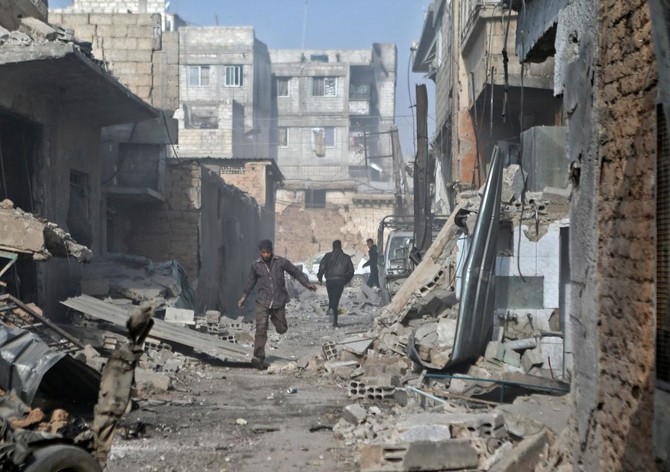
Houthis offer education to students suspended in US protest crackdown

Students have rallied or set up tents at dozens of campuses in the United States in recent days to protest against Israel’s war in Gaza, now in its seventh month.
Demonstrators have called on President Joe Biden, who has supported Israel’s right to defend itself, to do more to stop the bloodshed in Gaza and demanded schools divest from companies that support Israel’s government.
Many of the schools, including Ivy League Columbia University in New York City, have called in police to quell the protests.
“We are serious about welcoming students that have been suspended from US universities for supporting Palestinians,” an official at Sanaa University, which is run by the Houthis, told Reuters. “We are fighting this battle with Palestine in every way we can.”
Sanaa University had issued a statement applauding the “humanitarian” position of the students in the United States and said they could continue their studies in Yemen.
“The board of the university condemns what academics and students of US and European universities are being subjected to, suppression of freedom of expression,” the board of the university said in a statement, which included an email address for any students wanting to take up their offer.
The US and Britain returned the Houthi militia to a list of terrorist groups this year as their attacks on vessels in and around the Red Sea hurt global economies.
The Houthi’s offer of an education for US students sparked a wave of sarcasm by ordinary Yemenis on social media. One social media user posted a photograph of two Westerners chewing Yemen’s widely-used narcotic leaf Qat. He described the scene as American students during their fifth year at Sanaa University.
Israel confirms death of hostage held in Gaza

- Or was killed and his body held in Gaza since October 7
- His wife was killed in the initial attack while two of their three children were abducted
Jerusalem: An Israeli man held hostage in Gaza since the October 7 Hamas attack has been confirmed dead, the government and the kibbutz where he had lived said early Friday.
Dror Or, 49, is the latest hostage to have been confirmed dead by Israel after begin captured during the Hamas attack that triggered war with Israel.
Or was killed and his body held in Gaza since October 7, the Beeri kibbutz said. It was one of the communities hardest hit in the Hamas attack on southern Israel from the Gaza Strip.
His wife Yonat was killed in the initial attack while two of their three children, Noam and Alma, aged 17 and 13, were abducted and then freed in November as part of a ceasefire and hostages-for-prisoners swap deal between Israel and Hamas.
Israel estimates that 129 captives seized by militants during their attack remain in Gaza. The military says 35 of them are dead including Or.
“We are heartbroken to share that Dror Or, who was kidnapped by Hamas on October 7, had been confirmed as murdered and his body is being held in Gaza,” the Israeli government said on X.
The two children and their brother Yahli are now orphans, it added.
Campaign group the Hostages and Missing Families Forum said it will provide assistance to Or’s family.
The forum and Israeli government did not say how they learned of Or’s death.
“Only by securing the release of all hostages, the living for rehabilitation, the deceased for burial can our people’s revival and future be ensured,” the forum said in a statement.
“Israeli government must exhaust every effort to bring Dror and... the other murdered hostages back for honorable burials in Israel.”
Or’s death was announced as mediators Qatar, the United States and Egypt await Hamas’s response to a new Israeli proposal for a ceasefire and hostage release.
In late November during a week-long truce, 105 hostages were released including 80 Israelis and people from other countries in exchange for the release of 240 Palestinians held by Israel.
The war started with Hamas’s October 7 attack on Israel that resulted in the deaths of 1,170 people, mostly civilians, according to an AFP tally of Israeli official figures.
Israel’s retaliatory offensive against Hamas has killed at least 34,596 people in Gaza, mostly women and children, according to the Hamas-run territory’s health ministry.
Hamas sending delegation to Egypt for further ceasefire talks in latest sign of progress

- After months of stop-and-start negotiations, the ceasefire efforts appear to have reached a critical stage
- Question remains whether Israel will accept end to war without reaching its stated goal of destroying Hamas
BEIRUT: Hamas said Thursday that it was sending a delegation to Egypt for further ceasefire talks, in a new sign of progress in attempts by international mediators to hammer out an agreement between Israel and the militant group to end the war in Gaza.
After months of stop-and-start negotiations, the ceasefire efforts appear to have reached a critical stage, with Egyptian and American mediators reporting signs of compromise in recent days. But chances for the deal remain entangled with the key question of whether Israel will accept an end to the war without reaching its stated goal of destroying Hamas.
The stakes in the ceasefire negotiations were made clear in a new UN report that said if the Israel-Hamas war stops today, it will still take until 2040 to rebuild all the homes that have been destroyed by nearly seven months of Israeli bombardment and ground offensives in Gaza. It warned that the impact of the damage to the economy will set back development for generations and will only get worse with every month fighting continues.
The proposal that US and Egyptian mediators have put to Hamas -– apparently with Israel’s acceptance — sets out a three-stage process that would bring an immediate six-week ceasefire and partial release of Israeli hostages, but also negotiations over a “permanent calm” that includes some sort of Israeli withdrawal from Gaza, according to an Egyptian official. Hamas is seeking guarantees for a full Israeli withdrawal and complete end to the war.
Hamas officials have sent mixed signals about the proposal in recent days. But on Thursday, its supreme leader, Ismail Haniyeh, said in a statement that he had spoken to Egypt’s intelligence chief and “stressed the positive spirit of the movement in studying the ceasefire proposal.”
The statement said that Hamas negotiators would travel to Cairo “to complete the ongoing discussions with the aim of working forward for an agreement.” Haniyeh said he had also spoken to the prime minister of Qatar, another key mediator in the process.
The brokers are hopeful that the deal will bring an end to a conflict that has killed more than 34,000 Palestinians, according to local health officials, caused widespread destruction and plunged the territory into a humanitarian crisis. They also hope a deal will avert an Israeli attack on Rafah, where more than half of Gaza’s 2.3 million people have sought shelter after fleeing battle zones elsewhere in the territory.
If Israel does agree to end the war in return for a full hostage release, it would be a major turnaround. Since Hamas’ Oct. 7 attack stunned Israel, its leaders have vowed not to stop their bombardment and ground offensives until the militant group is destroyed. They also say Israel must keep a military presence in Gaza and security control after the war to ensure Hamas doesn’t rebuild.
Publicly at least, Israeli Prime Minister Benjamin Netanyahu continues to insist that is the only acceptable endgame.
He has vowed that even if a ceasefire is reached, Israel will eventually attack Rafah, which he says is Hamas’ last stronghold in Gaza. He repeated his determination to do so in talks Wednesday with US Secretary of State Antony Blinken, who was in Israel on a regional tour to push the deal through.
The agreement’s immediate fate hinges on whether Hamas will accept uncertainty over the final phases to bring the initial six-week pause in fighting — and at least postpone what it is feared would be a devastating assault on Rafah.
Egypt has been privately assuring Hamas that the deal will mean a total end to the war. But the Egyptian official said Hamas says the text’s language is too vague and wants it to specify a complete Israeli pullout from all of Gaza. The official spoke on condition of anonymity to talk about the internal deliberations.
On Wednesday evening, however, the news looked less positive as Osama Hamdan, a top Hamas official, expressed skepticism, saying the group’s initial position was “negative.” Speaking to Hezbollah’s Al-Manar TV, he said that talks were still ongoing but would stop if Israel invades Rafah.
Blinken hiked up pressure on Hamas to accept, saying Israel had made “very important” compromises.
“There’s no time for further haggling. The deal is there,” Blinken said Wednesday before leaving for the US
An Israeli airstrike, meanwhile, killed at least five people, including a child, in Deir Al-Balah in central Gaza. The bodies were seen and counted by Associated Press journalists at a hospital.
The war broke out on Oct. 7. when Hamas militants broke into southern Israel and killed over 1,200 people, mostly Israelis, taking around 250 others hostage, some released during a ceasefire on November.
The Israel-Hamas war was sparked by the Oct. 7 raid into southern Israel in which militants killed around 1,200 people, mostly civilians, and abducted around 250 hostages. Hamas is believed to still hold around 100 hostages and the remains of more than 30 others.
Since then, Israel’s campaign in Gaza has wreaked vast destruction and brought a humanitarian disaster, with several hundred thousand Palestinians in northern Gaza facing imminent famine, according to the UN More than 80 percent of the population has been driven from their homes.
The “productive basis of the economy has been destroyed” and poverty is rising sharply among Palestinians, according to the report released Thursday by the United Nations Development Program and the Economic and Social Commission for Western Asia.
It said that in 2024, the entire Palestinian economy — including both Gaza and the West Bank -– has so far contracted 25.8 percent. If the war continues, the loss will reach a “staggering” 29 percent by July, it said. The West Bank economy has been hit by Israel’s decision to cancel the work permits for tens of thousands of laborers who depended on jobs inside Israel.
“These new figures warn that the suffering in Gaza will not end when the war does,” UNDP administrator Achim Steiner said. He warned of a “serious development crisis that jeopardizes the future of generations to come.”
Israel builds ‘cyber dome’ against Iran’s hackers

- Israeli cybersecurity agency had thwarted around 800 significant attacks since the Oct. 7 Gaza war erupted
- But some attacks could not be foiled, including against hospitals in which patient data was stolen
TEL AVIV: Israel’s Iron Dome defense system has long shielded it from incoming rockets. Now it is building a “cyber dome” to defend against online attacks, especially from arch foe Iran.
“It is a silent war, one which is not visible,” said Aviram Atzaba, the Israeli National Cyber Directorate’s head of international cooperation.
While Israel has fought Hamas in Gaza since the October 7 attack, it has also faced a significant increase in cyberattacks from Iran and its allies, Atzaba said.
“They are trying to hack everything they can,” he told AFP, pointing to Hamas and Lebanon’s Hezbollah movement but adding that so far “they have not succeeded in causing any real damage.”
He said around 800 significant attacks had been thwarted since the war erupted. Among the targets were government organizations, the military and civil infrastructure.
Some attacks could not be foiled, including against hospitals in the cities of Haifa and Safed in which patient data was stolen.
While Israel already has cyber defenses, they long consisted of “local efforts that were not connected,” Atzaba said.
So, for the past two years, the directorate has been working to build a centralized, real-time system that works proactively to protect all of Israeli cyberspace.
Based in Tel Aviv, the directorate works under the authority of the prime minister. It does not reveal figures on its staff, budget or computing resources.
Israel collaborates closely with multiple allies, including the United States, said Atzaba, because “all states face cyber terrorism.”
“It takes a network to fight a network,” he said.
Israel’s arch foe Iran is “an impressive enemy” in the online wars, said Chuck Freilich, a researcher at the Institute for National Security Studies, which is affiliated with Tel Aviv University.
“Its attacks aim to sabotage and destroy infrastructure, but also to collect data for intelligence and spread false information for propaganda purposes,” he said.
Iran has welcomed Hamas’s October 7 attack on Israel, which resulted in the deaths of 1,170 people, mostly civilians, according to an AFP tally based on Israeli official figures.
Israel’s retaliatory offensive against Hamas has killed at least 34,596 people in Gaza, mostly women and children, according to the Hamas-run territory’s health ministry.
Regional tensions have soared, particularly after Iran for the first time fired hundreds of missiles directly at Israel last month in retaliation for a deadly Israeli air strike on the Iranian consulate in Damascus.
It was the most dramatic escalation yet after a years-long shadow war of killings and sabotage attacks between Israel and Iran.
Freilich argued in a study published in February that Iran was relatively slow to invest in cyberwarfare, until two key events triggered a change.
First, its leaders took note of how anti-government protesters used the Internet as a tool to mobilize support for a 2009 post-election uprising.
In the bloody crackdown that crushed the movement, Iran’s authorities cut access to social media and websites covering the protests.
Then, in September 2010, a sophisticated cyberattack using the Stuxnet virus, blamed by Iran on Israel and the United States, caused physical damage to Tehran’s nuclear program.
Freilich said the attack “demonstrated Iran’s extreme vulnerability and led to a severe national shock.”
Since then, Iran has gained substantial expertise to become “one of the most active countries in cyberspace,” he said
While Israel is considered a major cyber power, Iran was only likely to improve, said Freilich.
He pointed to assistance from Russia and China, as well as its much larger population and an emphasis on cyber training for students and soldiers alike, adding that the trend was “concerning for the future.”
Atzaba insisted that the quantity of hackers is secondary to the quality of technology and the use it is put to.
“For the past two years, we have been developing a cyber dome against cyberattacks, which functions like the Iron Dome against rockets,” he said.
“With cyber dome, all sources are fed into a large data pool that enables a view of the big picture and to invoke a national response in a comprehensive and coordinated manner.”
The Israeli system has various scanners that continuously “monitor Israeli cyberspace for vulnerabilities and informs the stakeholders of the means to mitigate them,” he said.
Israel’s cyber strength relied on close cooperation between the public, private and academic sectors, as well as Israel’s “white hat” hackers who help identify weaknesses.
“We work hand in hand,” he said.
Kurds deny torturing detainees in north Syria camps
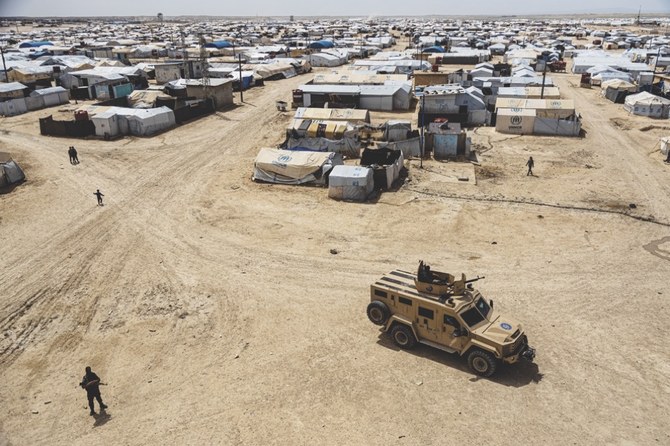
- Rights group alleges cruelty against Daesh militant prisoners and their families
JEDDAH: Kurdish authorities in northeast Syria on Thursday denied claims by Amnesty International that they tortured Daesh militants and their dependents detained in internment camps.
More than 56,000 prisoners with links to the Islamist militant group are still being held five years after Daesh were driven out of their last territory in Syria. They include militants locked up in prisons, and Daesh fighters’ wives and children in Al-Hol and Roj camps.
Amnesty secretary general Agnes Callamard said Kurdish authorities had “committed the war crimes of torture and cruel treatment, and probably committed the war crime of murder.”
The semi-autonomous Kurdish administration in northeast Syria said it “respects its obligations to prevent the violation of its laws, which prohibit such illegal acts, and adheres to international law.”
Any such crimes that may have been perpetrated were “individual acts,” it said, and asked Amnesty to provide it with any evidence of wrongdoing by its security forces and affiliates.
“We are open to cooperating with Amnesty International regarding its proposed recommendations, which require concerted regional and international efforts,” it said.
Kurdish authorities said they had repeatedly asked the international community for help in managing the camps, which required “huge financial resources.”
Al-Hol is the largest internment camp in northeast Syria, with more than 43,000 detainees from 47 countries, most of them women and children related to Daesh fighters.


